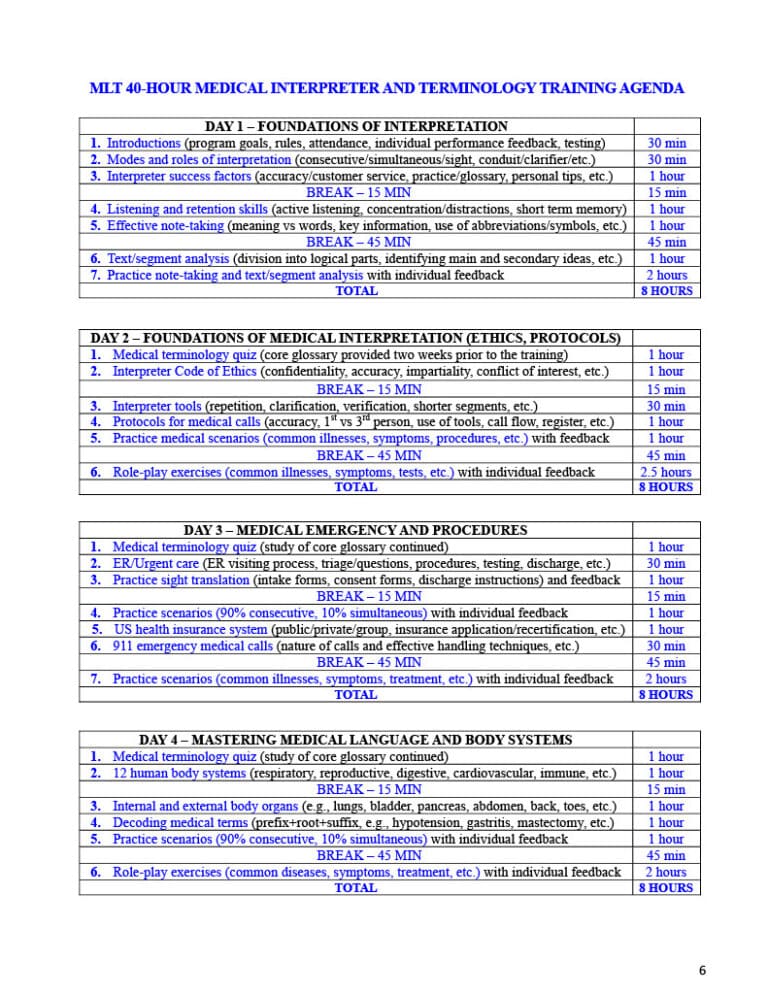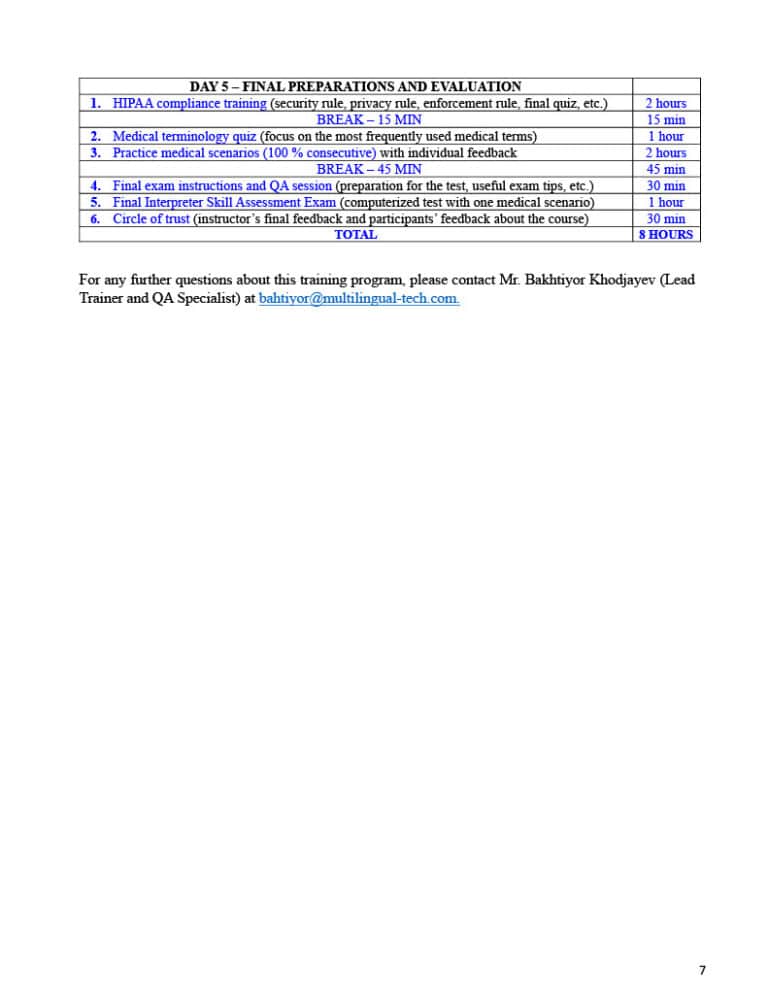MLT 40-HOUR MEDICAL INTERPRETER AND TERMINOLOGY TRAINING PROGRAM
Course Overview
This instructor-led 40-hour medical interpreter training program is offered by Multilingual Technologies Inc. (“MLT”), a premier language service provider based in California, USA. The goal of this course is to develop and enhance the essential skills necessary for trainees to either begin or advance their careers as medical interpreters.
The primary emphasis of this five-day training is on extensive practice with medical scenarios, terminology, and providing corrective feedback for continuous improvement. The course is directed towards developing and improving the following fundamental interpreter skills:
- Consecutive, simultaneous, and sight interpretation.
- Attentive listening and development of short-term memory (retention).
- Analysis of segments and distillation into main and secondary ideas for better comprehension.
- Effective note-taking skills.
- Use of interpreter tools: repetition, clarification, verification, and shorter segments.
Upon completing the five-day training, students are expected to pass a final oral exam, meeting the minimum 40-hour requirement to become qualified for handling medical calls. This non-language-specific course is structured to prepare interpreters for any target language. The teaching methodology is highly interactive, ensuring proactive participation by each candidate.
This training program has been developed using industry best practices and extensive experience of seasoned interpreters and trainers at MLT. It has received full approval from the Boostlingo Professional Interpreter Network (BPIN) and adheres to guidelines and standards set by leading medical interpreting authorities such as the National Council on Interpreting in Health Care (NCIHC). For more detailed information, a course plan and agenda are provided on the last page of this document.
Course Format and Attendance Policy
This course is 100% instructor-led and conducted online through MS Teams, with a focused class size of 8-10 participants. To foster a highly engaging and interactive learning environment, participants will be required to keep their cameras on during the sessions. The training’s theoretical components are delivered through an interactive approach that actively involves students in discussions. A major part of the course comprises daily practical sessions, exercises, and quizzes, where students practice their interpretations and receive individual feedback. These aspects are further elaborated in the “Assessment and Feedback” section below, detailing the approaches and methodologies used to evaluate student performance and provide structured feedback.
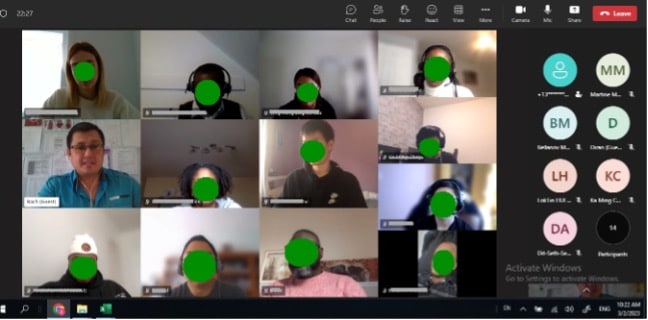
Main Course Instructor
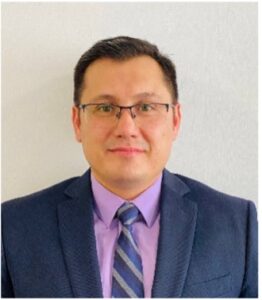
Bakhtiyor Khodjayev (MA, LSSBB) is a distinguished trainer and interpreter with 15 years of combined experience in interpretation, training, and consulting. For the past eight years, Mr. Khodjayev has been working as an Uzbek and Russian Medical Interpreter and Trainer and has been accredited by several reputable organizations in the US and Canada, including Language Line Solutions (LLS), Boostlingo Professional Interpreter Network (BPIN), Voyce Global, Multilingual Technologies, Jeenie Interpreters, the International Refugee Board (IRB) of Canada, Canada Border Services Agency (CBSA), CanTalk Canada, and Costi Translations Bureau. In the past two years alone, Mr. Khodjayev has accumulated over 4000 hours of experience in interpreting medical calls. He is currently in the process of obtaining his national certification in healthcare interpretation.
Presently, Mr. Khodjayev holds the position of Lead Trainer and Quality Assurance Specialist at Multilingual Technologies Inc. (“MLT”), a renowned multilingual professional language service provider based in Santa Clara, California. Prior to his role at MLT, he was the main instructor at Language Line Solutions (LLS), where he taught their two-week interpreter training program. This program culminates with a final ISA test, the successful passing of which is a prerequisite for employment at LLS. Throughout his career, Mr. Khodjayev has trained and coached over 300 interpreters from diverse countries from all continents, with his trainees achieving an impressive average passing rate of 92%.
Mr. Khodjayev earned his Master’s degree in Economics from Central European University in Hungary and his Bachelor’s degree in International Relations, majoring in Languages, from the University of World Economy and Diplomacy in Uzbekistan. Bakhtiyor has been living permanently in Canada for the last 18 years. He is fluent in English, Uzbek, Russian, and Turkish, and has conversational proficiency in German.
In addition to his role at MLT, Bakhtiyor serves as a Lead Business Trainer for Global Performance Improvement Inc., a Canadian business consulting firm. There, he teaches courses on Business Diagnostics and Lean Six Sigma to small and medium enterprises in Toronto, Canada.
Assessment and Feedback
Part 1 – daily terminology quizzes
Each day begins with a terminology quiz based on the core glossary, which is provided to candidates two weeks prior to the training. Candidates are assessed on their ability to interpret a series of medical terms quickly and confidently into their target language, as well as provide concise English definitions or explanations upon the instructor’s request. The accuracy of their terminology in the target language is periodically cross-checked through the participation of fellow interpreters in the class. Each participant’s performance in the terminology quizzes is evaluated and scored based on the number of terms they are familiar with (e.g., correctly interpreting 7 out of 10 medical terms equals a 70% score).
Part 2 – daily practice scenarios
Students dedicate a substantial amount of time each day, between 3 to 4 hours, to practicing the interpretation of realistic medical scenarios. During these sessions, the instructor reads selected sections and randomly calls students from the list to perform interpretation. The instructor takes detailed notes on each interpreter’s performance during their renditions. After each rendition, instructor provides detailed feedback, focusing on both strengths and areas for improvement. This feedback is based on language and interpreting proficiency as well as customer service skills, details of which will be explained below.
The instructor’s feedback is based on specific categories, as highlighted in the table below. After each class, the instructor records the number of errors made by each student in every category. These errors are further analyzed to assess the relative performance of each student (class percentile) and to calculate the total number of errors made.
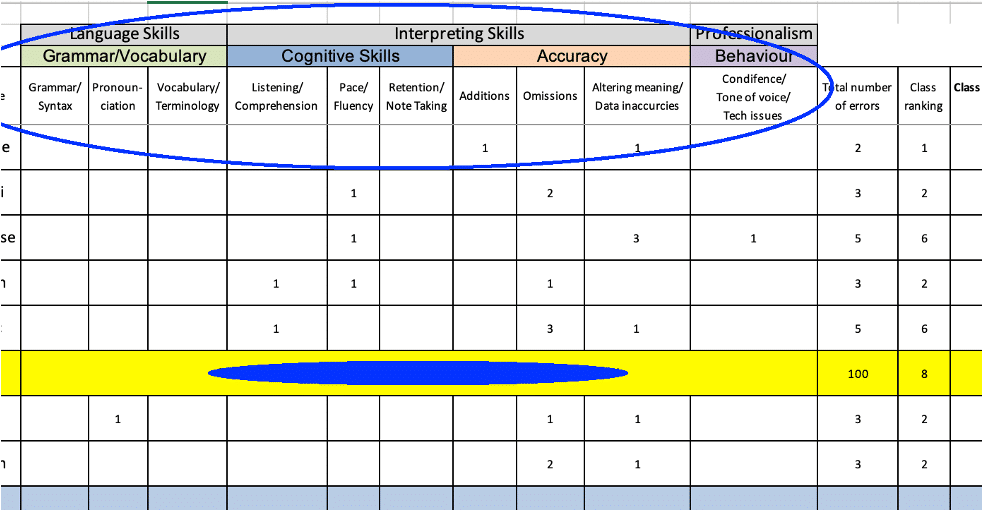
It is anticipated that the total number of mistakes made by each student will decrease and their relative class performance (class percentile) will increase as the training progresses, with significant improvement expected from each student by the fifth day. On the fifth day, the instructor provides individual feedback to each student, reflecting on their overall performance throughout the five days of the training (see example in “Trainer Comments” section in the same table above).
Part 3 – final exam and certificate
On the final day, each candidate takes a Final Exam. Students are expected to accurately interpret (consecutively) a role-play scenario, which features a recorded conversation between a provider (an English speaker) and a patient (a speaker of the target language). The computerized examination is customized for each target language and typically takes about 40 minutes to complete. Candidates must achieve a minimum score of 80% to pass; those who meet this criterion will receive a certificate, indicating their qualification to handle medical calls (see a sample certificate on the left below).
Students who do not meet the 80% threshold will still be awarded a certificate of completion; however, this certificate will indicate their qualification to handle only general, non-medical calls (see a sample certificate on the right below). Candidates who fail at the borderline may be given one opportunity to retake the exam.


For any further questions about this training program, please contact Mr. Bakhtiyor Khodjayev (Lead Trainer and QA Specialist) at bakhtiyor@multilingual-tech.com.
Agenda
